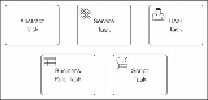Information Technology Reference
In-Depth Information
Task types in jBPM6
As we previously mentioned, one of the most important types of flow objects is the activ-
ity. Each activity will represent a task related to our business scenario. The specification
provides a set of specific tasks that can be used to define different behaviors. This section
covers the most commonly used tasks that we need to know in order to start modeling our
business scenario. The task types shown in the following diagram will be described in this
section:
The tasks in the preceding diagram are defined as follows:
•
Abstract task
: This is the base type of all the other tasks in BPMN 2.0. According
to the specification, this task is abstract and we should never use it in our pro-
cesses. However, jBPM6 uses it as an extension point to introduce new task defini-
tions. We will see how this is achieved in more detail in
Chapter 5
,
Creating a Pro-
cess Project in the KIE Workbench
.
•
Service task
: This allows us to represent interactions with external automated sys-
tems. Each time our business process needs to interact with a service or procedure,
we will use a service task. The service task element defines an attribute called im-
plementation, which is used to specify the underlying implementation of the ser-
vice that we are calling.
•
User task
: This represents a human interaction. Each time we want to represent a
person doing an activity, we use a User task to model this situation. Because User
tasks represent a human interaction, we need to provide a way to assist the per-
former during this interaction. The jBPM6-based BRMS provides a task list-orien-
ted user interface that assists each user during these interactions. We will take a
close look at this approach in
Chapter 6
,
Human Interactions
.
•
Business Rule task
: This allows us to interact with a
Business Rule Engine
(
BRE
) to do some business logic evaluation. The interaction with the BRE usually
involves sending information to the Engine, which will be evaluated by a set of
business rules and a result will be returned. In the case of jBPM6, integration with

